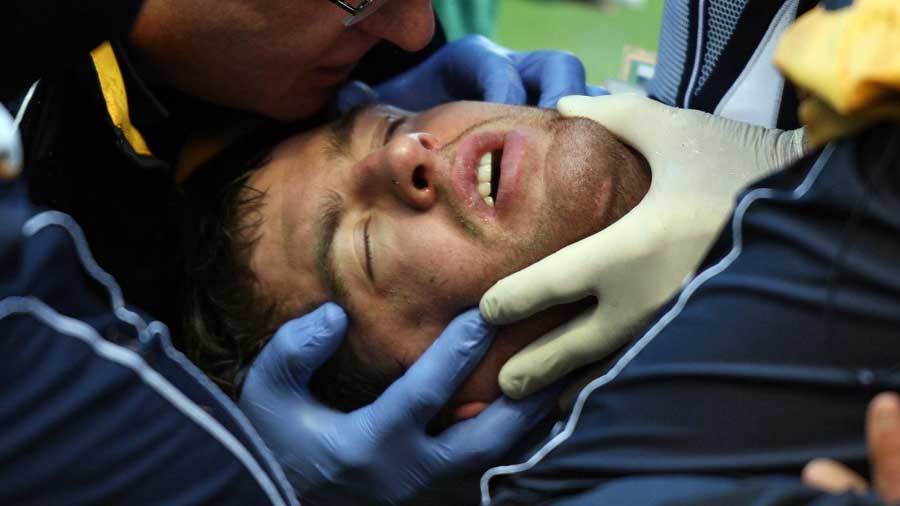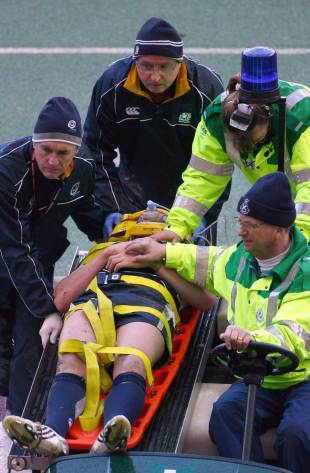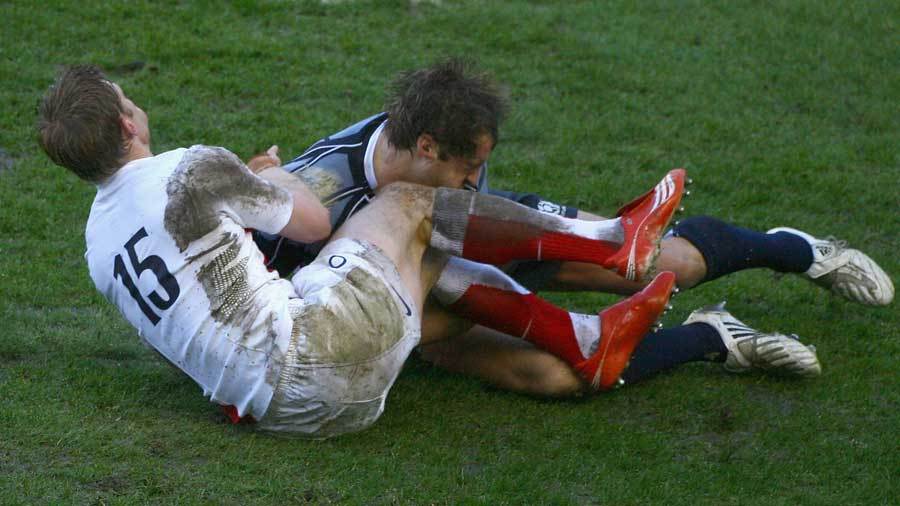|
Rory Lamont on Concussion
'It isn't the metal plates in my face that bother me, it's the unseen damage of concussion'
Rory Lamont
December 18, 2013

Rory Lamont receives treatment after being knocked out in 2008 © PA Photos
Enlarge
Rory Lamont played 29 Tests for Scotland between 2005 and 2012. He retired from the game in 2013 and has written about his experiences of the numerous concussions he sustained while playing the game When I spoke out about rugby's concussion problem a few months ago I hoped my revelations would spark debate, and that they did. Concussion management in rugby is something that has, for a number of years, concerned me. It is difficult for any player still in the game to voice their concerns without appearing 'soft' or, worse, risking backlash from employers and policy makers. The Pitch Side Concussion Assessment (PSCA) has been under intense scrutiny from the media and from medical experts since it was introduced. It is only one aspect of concussion management, it is merely the tool used to aid pitch side medical staff to identify a possible concussion during a game. It has had some high profile failings, but it shouldn't distract us from a larger systemic and cultural failing in rugby's management of concussion. Rugby is a brutal contact sport, more so now than any time in its history. Injuries are inevitable, anyone who decides to play the game is fully aware that it is not a body friendly activity, in fact a flagrant disregard for your own welfare almost seems a prerequisite for achieving success at the highest level. The culture in professional rugby is all about bravado and self-sacrifice. There is nothing more glorious than to show your team-mates, coaches and fans that you are willing to put your body on the line for the cause. If you decide to complain about any of your aches and pains, don't expect too much interest or sympathy. You may also lose the respect of your team-mates and coaches if you do it too often, as putting your pain on display is a subliminal sign of mental weakness. Rugby players are trained to run through brick walls and thus pain and injury are ingrained into the rugby experience. When it comes to concussion, this bravado culture may have some serious implications. Bodies collide and, occasionally, you take an impact to the head. If the impact is significant enough your brain rattles inside your skull, which leads to concussion with symptoms ranging from disorientation to being knocked clean out. Instead of concussion, medics prefer to think of it as a 'mild brain injury' as, your brain has been injured.

Carted off the field in 2008
© Getty Images
Enlarge
I know this experience very well. My brain has been rattled more than most, even by rugby's standards. I am in double figures for the number of times I've been knocked unconscious on the rugby field, never mind all the other times I had everything short of being knocked out. The worst was during the 2008 Calcutta Cup match at Murrayfield. While challenging for a loose ball, my head collided with an opponent's knee. The collision knocked me unconscious and into a seizure. The impact was so severe, I needed facial reconstruction to my cheekbone, eye socket and jaw. Looking back on this incident it's not the scar below the eye from the surgery, or the collection of metal plates I have in my face that bother me. What concerns me most is the damage I can't see. The damage that may well be lurking in my brain and has the potential to cause serious neurological issues. I still walk with a limp, a result of a broken leg in the 2012 Six Nations. There is a possibility I won't be able to run again in my life but I knew this risk when I started playing the game. I made the decision that the rewards and life experiences available in the game I loved were worth the known risks. When seeing an ex-rugby player limping as a result of leg injuries collected over their career, there's no great surprise- 'his knees are trashed from all that abuse he gave them'. But now it seems the accumulated injuries to my brain over the years, the 'concussions', could leave me with long-term problems, just like my broken leg might. Suffice to say that throughout my professional rugby career I was not fully aware of all the possible health risks. I am only now starting to understand what the issues might be. It puts me at unease thinking about it. There is now evidence of a link between concussion and increased risk of early-onset dementia. Having experienced dozens of concussions in my career, am I at increased risk of suffering neurological issues, specifically early-onset dementia? If you ask brain injury expert and consultant neuropathologist Dr Willie Stewart he will say 'that's a possibility, yes'. I had the opportunity to meet Dr Stewart here in Glasgow. He showed me the brain tissue of a former amateur rugby player who was displaying the same level of abnormal proteins in his brain that someone with a lifetime of boxing might show. This he called 'chronic traumatic encephalopathy' (CTE). He also explained this wasn't a new pathology, just renaming of an old diagnosis previously known as 'dementia pugilistic', aka: punch drunk syndrome. In the sporting world this was something previously believed to be reserved for boxers. It displays itself as memory, speech and coordination problems. But in the past decade or so it has become increasingly clear this problem is not exclusive to boxers. Evidence from American Football suggests that as few as three concussions can lead to neurological problems, which may take decades to appear. The recent results of the NFL concussion lawsuit made the IRB sit up and take notice. More than 4,500 former players, some suffering from dementia, depression or Alzheimer's sued the NFL, accusing it of concealing the dangers of concussions. The NFL reached a settlement worth an estimated $765 million. One study that could not be ignored was commissioned by the National Football League (NFL) itself, it showed that Alzheimer's disease or similar dementias appear in former players at a rate 19 times higher than the normal population. Retired American football players have almost a twenty times higher rate of dementia under the age of 50 than people who have not played football.
Some argue that rugby is not NFL and a comparison should not be made. Personally I feel that is out of touch with the realty of today's professional game. Rugby today is brutal, the collisions are monstrous and they occur at a relentless frequency. Aside from the big tackles, consider the kind of impacts occurring at the ruck alone. It is repeated head-on-head collisions. Players today are bigger, faster and stronger than ever before, and this means bigger impacts. Concussion is now the most common injury in rugby union. According to the RFU's most recent injury audit last year there are estimated to be 5.1 concussions per 1000 hours of play. As high, if not higher, than in similar NFL studies. I know from experience the majority of concussions in rugby go undiagnosed. I have played alongside players who were concussed almost weekly but never thought to report it to medical staff. Often a player believes they have to be knocked out cold for it to be concussion, other times it is because they don't want to be forced off the pitch. Currently many players are happy to remain silent about their concussions; little do they understand exactly what they may be risking. This desperately needs to change and is a much bigger problem than I believe the IRB currently recognises. Until rugby makes a better effort to educate players it will continue. The NFL are years ahead of rugby in concussion research, so we should pay much attention to the research coming from the US. There are some who claim current research is inconclusive and we should wait for more evidence. It is possible the IRB wants to wait for the link to become irrefutable before they concede the concussion/dementia link is significant. As with most medical conclusions that could take a long time to happen. Think how long it took big tobacco to concede the link between smoking and health problems. Addressing concussion is not about sanitising rugby or stopping people from playing the game, it is simply about education and informed consent. We are talking about human welfare; there is a duty to ensure that every person who decides to participate in rugby has an understanding of the possible lasting effects of concussion. I never had informed consent when I played the game. If I had known the possible long-term health risks associated with concussion at the start of my career I may have retired from rugby after my 2008 concussion. I love rugby but nothing is worth doing long-term damage to your brain for. It is so important that rugby players at all levels are educated on concussion and its possible link to dementia. The IRB should be taking action now; otherwise it may be leaving themselves exposed to future lawsuits similar to the NFL case. Thursday - The flaws of the current concussion protocols 
The moment he picked up the injury in 2008 © Getty Images
Enlarge
© ESPN Sports Media Ltd
| |||||||||||||||
Live Sports
Communication error please reload the page.
-
Football
-
Cricket
-
Rugby
-
- Days
- Hrs
- Mins
- Secs
F1 - Abu Dhabi GP
Abu Dhabi Grand Prix December 11-131. Max Verstappen ()
2. Valtteri Bottas (Mercedes)
3. Lewis Hamilton (Mercedes)
4. Alexander Albon ()
5. Lando Norris ()
6. Carlos Sainz Jr ()
-
ESPNOtherLive >>
Golf - Houston Open
Snooker - China Open
Tennis - Miami Open

